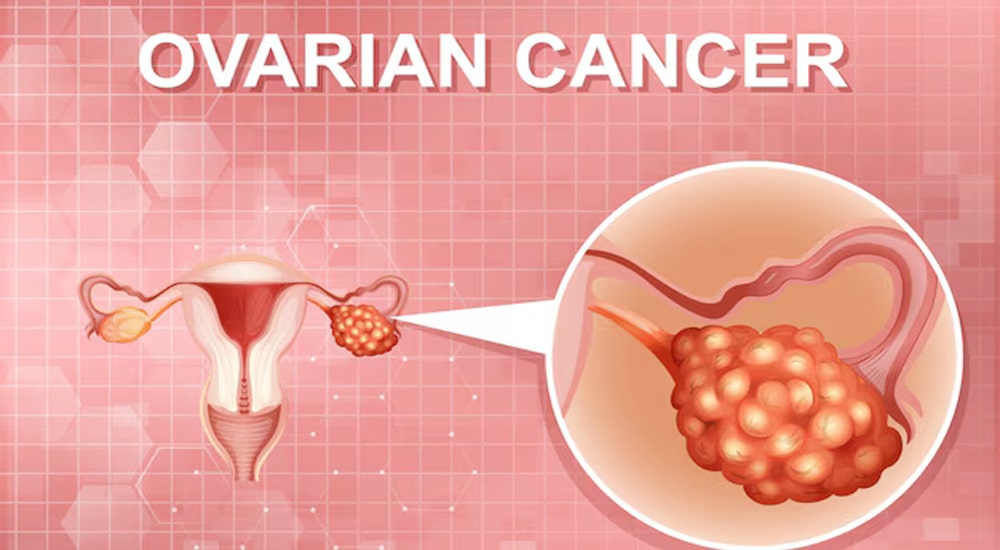
All you need to know about ovarian cancer
Posted By Suborna Fermi
Posted on Sep 02, 2024
Ovarian cancer is one of the most common cancers in women. This cancer develops in the ovaries, small organs in the female reproductive system that make eggs. This cancer is difficult to detect in the early stages, as it does not cause symptoms until the advanced stage. However, a person with ovarian cancer may experience abdominal pain or pressure and vaginal bleeding. Healthcare providers use chemotherapy, surgery or other cancer treatment to treat ovarian cancer.
What is ovarian cancer?
Ovarian cancer is a term that describes an unnatural or abnormal growth of cells in the ovaries or fallopian tubes. Ovaries are a part of a female’s reproductive system that produces eggs.
What are the symptoms of ovarian cancer?
Ovarian cancer begins in the outer linings of the ovary, called the ovary’s epithelium. In the early stages, it may not cause any symptoms. Ovarian cancer may spread throughout the abdomen before it causes any symptoms.
On the other hand, if any symptoms occur, they can be similar to other conditions, like a temporary bowel issue, irritable bowel syndrome, and premenstrual syndrome. However, ovarian cancer symptoms may worsen over time.
Early symptoms of ovarian cancer may include:
- Pain in the pelvis
- Unusual vaginal bleeding
- Frequent urination
- Constipation
- Bloating
- Feeling full after eating
- Pain in the abdomen or back
Along with these symptoms, people may also experience:
- Fatigue
- Nausea
- Shortness of breath
- Appetite loss
- Weightloss
Also, these can differ if the cancer spreads to other parts of the body.
What causes ovarian cancer?
Ovarian cancer occurs when the cells of that area divide and multiply abnormally. The exact cause of why cells begin to multiply is still unclear. However, healthcare providers have distinguished certain risk factors that can contribute to the development of ovarian cancer. Common risk factors include:
- Family history: Having a close relative who has ovarian cancer can increase your risk of developing ovarian cancer. Going for a genetic screening for mutation in the BRCA gene can determine if you have a risk of developing both ovarian and breast cancer.
- Age: Older women are more susceptible to developing ovarian cancer than younger women. Generally, women 64 years or older are vulnerable to developing ovarian cancer.
- Breast cancer: Several studies have found that people with breast cancer have higher risks of developing ovarian cancer. This generally happens due to a mutation in the BRCA gene. This is why some people with breast cancer who are also positive for gene mutation may be required to go for an oophorectomy or ovary removal surgery as prevention therapy.
- Reproductive history: People with a history of one or more full-term pregnancies have a lower risk of ovarian cancer. The more pregnancies one has, the lower the risk of having ovarian cancer. On the other hand, having a pregnancy after 35 age, or not having children is linked to a higher risk of ovarian cancer. Also, people using birth control pills have a lower risk of this cancer.
- Obesity: Several studies have found people with a body mass index (BMI) over 30 are more likely to have ovarian cancer.
- Hormone therapy: Having hormone replacement therapy after menopause increases one’s risk of ovarian cancer.
How is ovarian cancer diagnosed?
Firstly, your doctor would likely ask you about the symptoms, and your and your family's medical history. If they suspect ovarian cancer, they may carry out a pelvic exam and recommend certain diagnostic tests. They may recommend:
- Blood test: Blood tests are used to check the levels of the CA-125 marker.
- Imaging test: Transvaginal ultrasound, CT scan and MRI scan are used to detect ovarian cancer.
- Biopsy: A microscopic examination of a tissue sample.
- Laparoscopy: In this procedure, a thin tube with a camera will be inserted through a small hole in the abdomen to check the ovaries.
A biopsy is essential to determine whether a person has cancer. Healthcare providers recommend a biopsy during the initial diagnosis of the condition or following the tumour removal surgery.
How is ovarian cancer treated?
The treatment for ovarian cancer depends on various factors, such as:
- The type, stage or grade of the cancer
- Individual’s age and health
- Individual preferences and the accessibility of the treatment
The treatment may include:
- Surgery: The surgical options include a hysterectomy which involves the removal of one or both ovaries and affected lymph nodes.
- Chemotherapy: A person can use chemotherapy drugs by mouth, injection or infusion. This therapy is used to kill the cancer cells. However, this therapy can affect the whole body. Another chemotherapy option is intraperitoneal chemotherapy which involves delivering the drug directly into the affected body area.
- Radiation therapy: In this therapy, X-rays are used to kill cancer cells. Another technique of radiation therapy is inserting radioactive liquid into the peritoneum, which is mainly used in advanced ovarian cancer.
- Targeted therapy: This therapy targets specific cells that contribute to the cancer.
- Immunotherapy or biotherapy: This therapy boosts the immune system to defend against cancer. This therapy involves injecting certain substances to kill a tumour. Immunotherapy is also recommended for people with advanced ovarian cancer.
Nearly all types of ovarian cancer can be successfully treated if one receives a diagnosis at an initial stage. However, many factors including one’s age and overall health condition can affect the effectiveness of the treatment.
